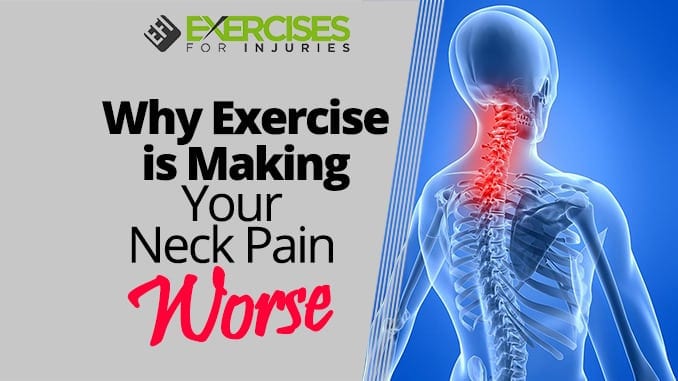
It is neck pain week with the release of Neck Pain Solved.
I am in a top-secret location.
This morning I left my top-secret location (hotel) for some coffee. I had to settle on gas station coffee as that was all that was open (it was okay). When I returned to my top-secret location, all the doors were locked.
I was locked out!
It brought back memories of when I got locked into my hotel room in Bolivia, but that is another story.
I tried everything to get back in. I was just about to climb up a wall to a second-floor window when I found “THE BAT PHONE.” You know, that hidden phone appears when you need to call the commissioner. I called the commissioner (night manager), and he let me back into the top-secret location (hotel), so I could work on this article in the Bat Cave (lobby).
An enjoyable way to start the day. Okay, let’s get back to neck pain.
Let’s start with the video.
CLICK HERE to Watch the Video on Why Exercise is Making Your Neck Pain Worse
Common Mistakes that lead to Neck Pain Worse
I was going to leave it with just the video, but I got thinking and wanted to add a little more.
A common mistake people end up making is performing a whole bunch of exercises for their neck to alleviate their neck pain and improve their neck injury. What often ends up happening is they end up flaring things up in their channel, making the pain worse, increasing their symptoms, and getting headaches.
This ends up causing your client to believe that their neck pain exercises don’t work or will make them worse, but the workouts are the key to helping them overcome their neck pain and prevent it from returning.
Balance Between Too Much and Too Little
There is a delicate balance between how much exercise to do and your neck pain. If you don’t do enough, you will not get any benefit, much like walking on a treadmill to lose weight.
When it comes to neck pain, I am very cautious. I would recommend erring on the side of caution and starting with very light stretching, very controlled movements, very smooth movements, not a long hold for the exercises, and not a lot of repetitions.
I focus on wanting people to feel that they have done something, not make things worse. Let me explain.
How Did It Feel?
What I ask my client is how they feel after:
- the exercise
- the session (training, appointment, or camp)
- later that day
- before bed
- the next morning
- the next day
I wouldn’t say I like the client’s increased pain, headache, or migraine. And I don’t want clients to have increased symptoms at these stages. I want them to feel like they have done something. The muscles should feel like they have been worked and used.
If this does happen, I need to look at my exercise program to see if an exercise did it. The total effect is something outside the exercise program and if there is more going on with their injury.
What to Do About An Increase in Tension?
If they feel they have an increase in tension, I want to give them strategies and exercises to help overcome the stress.
Strategies and exercises that I focus on are:
- decreasing activities that increase the stress on the neck
- self-massage exercises
- range of motion exercises
- thoracic mobility exercises
- neck stretching exercises
- tension relieving breathing exercises
I am a massive fan of this. I want to empower my clients to take ownership of their pain and injuries. The answers are within them. I provide a little guidance and help, but they are the best doctor, therapists, coaches, and trainers. I try to guide them on a path that will help them overcome their pain and injury, plus give them tools that they can use to prevent the damage and pain from coming back.
It is not the Exercises; It Is You.
This is hard for people to admit or see, but what we do before and after the neck pain exercises will affect one’s neck pain. I talked about this in an article about laptops and neck pain. Now the focus should be on tablets and smartphones.
Try to get your clients with neck pain thinking about what they do at home or work that puts undue stress on the neck and is slowing down their recovery.
Here are some things that I highlight:
- computer station (home or work)
- laptop use
- smartphone use
- driving position
- if there are any tasks at work that increase stress on the neck
- reading (bed, couch, table)
- television watching (home, work, gym)
- what they do with the phone when on a phone call
I hope this article helped you understand what else could make your neck pain worse. If you have some tips and strategies, please share them below.
Rick Kaselj, MS
P.S. – If you want more information on neck pain and injuries, check these out:
- A Neck Pain Exercise to Start Off With
- Exercise Rehabilitation of the Neck Course
- Rapid Recovery from Neck Fusion Surgery
If you are looking for an exercise program to help your clients with neck pain, check out Neck Pain Solved:
.






